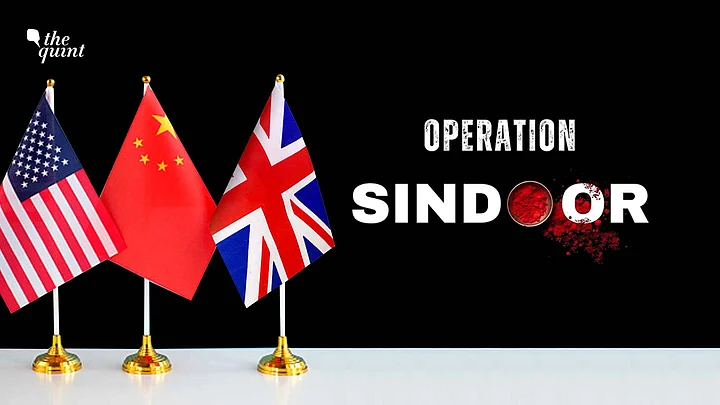The battle of perception has intensified. Each country is reacting to Operation Sindoor in its own way.
China and the major Muslim countries, supposedly close to Pakistan, have refrained from publicly supporting it. Surprisingly, the United States and the United Kingdom have not been very supportive of India in their responses, though France and Japan have made encouraging statements.
Having the truth on our side is not enough in a situation when Pakistan has unleashed a propaganda war. For example, it is imperative to convince the world that India conducted nine precision strikes without hurting civilians, and facing much resistance from Pakistani interceptors. This is not easy because global media networks are giving prominence to the Pakistani narrative.
It is equally important to reach out to the Pakistani public with the message that India’s target is restricted to terror groups and a couple of self-serving military top brass, including General Asim Munir and Asim Malik, the head of Inter-state Intelligence agency (ISI), who allegedly plotted the Pahalgam massacre. Malik was promoted to the rank of National Security Advisor on 1 May.
It is not impossible to use the internet to connect with the public in Pakistan, where vast sections are rallied against the military either because they are followers of former Prime Minister Imran Khan or are bearing the burnt of a near-bankrupt economy. Four different languages—Urdu, Punjabi, Sindhi, and Kashmiri—are spoken in both countries.
Munir’s Political Moves
General Munir, who released a video showing the Pakistani army as a benevolent organisation, is keen to enhance his personal popularity and is possibly trying to capture political power—as General Parvez Musharraf did earlier, after removing the Nawaz Sharif government in 1999. The present government of Prime Minister Shahbaz Sharif faces a similar danger because Munir, who pushed Imran Khan into jail, is seeking popularity at the political level.
India wants to avoid high-level escalation because it will weaken the elected government in the face of the military’s rising popularity and possibly lead to a military rule in Pakistan—something New Delhi does not want to see happen.
The conflict is being watched for different reasons by politicians, diplomats, and arms dealers across the world from their different viewpoints.
China’s Calculations
“China opposes all forms of terrorism. We urge both sides to act in the larger interest of peace and stability, remain calm, exercise restraint, and refrain from taking actions that may further complicate the situation,” a Chinese foreign ministry spokesperson said in a statement.
Hidden within Beijing’s refusal to give outright support to Pakistan is its frustration with General Munir, who failed to protect Chinese engineers and workers from attacks by Balochistan militants and ensure law and order along the Chinese-funded China Pakistan Economic Corridor. Besides that, China is also keen to expand economic relations with India.
But it is never easy to read the Chinese mind. An important question is whether China would step up supplies of weapons and spares during an armed conflict with India. Beijing has strong reasons to avoid getting involved in the India-Pakistan conflict at a time when it is battling an economic slowdown and trade challenges thrown up by the US administration under President Donald Trump. But India needs to carefully watch Chinese dealings with Pakistan over the coming days.
Most countries would act against Pakistan’s interests only if they think that it is losing to India.
There is much less concern about Pakistan’s role as a terror sponsoring state, because different countries hope to use it as a connecting point to Afghanistan and a part of the Middle East, or hope to sell weapons to it.
Mixed Signals from Allies
The most supportive comments have come from France, which sold the Rafale jet fighters and hopes to sell more to India. Japan has condemned terrorism in all its forms. It is engaged in discussions with India to sell Unicorn communication antennas similar to those installed on a new Japanese Maritime Self-Defence Force destroyer.
US President Trump struck to his earlier statement that India and Pakistan have been fighting for centuries. US State Department spokesperson later said: "We are aware of the reports, however, we have no assessment to offer at this time”.
The UAE’s Deputy Prime Minister, Sheikh Abdullah bin Zayed Al Nahyan, has called on India and Pakistan to exercise restraint, de-escalate tensions, and avoid further escalation that could threaten regional and international peace. Saudi Arabia is distancing itself from the situation because it is caught between an Islamic co-traveller and the second-biggest customer for its oil.
In any case, India should make note of the indifferent behaviour of friends, like the UK, which has just signed a free trade agreement with New Delhi.
"Our message would be that we are a friend, a partner to both countries. We stand ready to support both countries," UK’s Business and Trade Secretary Jonathan Reynolds said.
(Saibal Dasgupta has been a foreign correspondent for 18 years and has authored Running with the Dragon: How India Should Do Business with China. This is an opinion piece, and the views expressed are the author’s own. The Quint neither endorses nor is responsible for them.)
